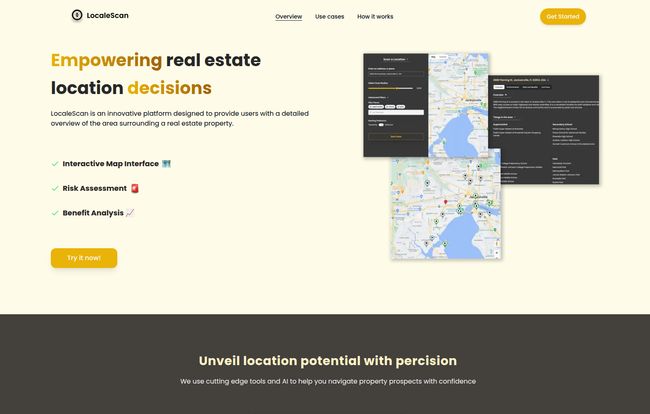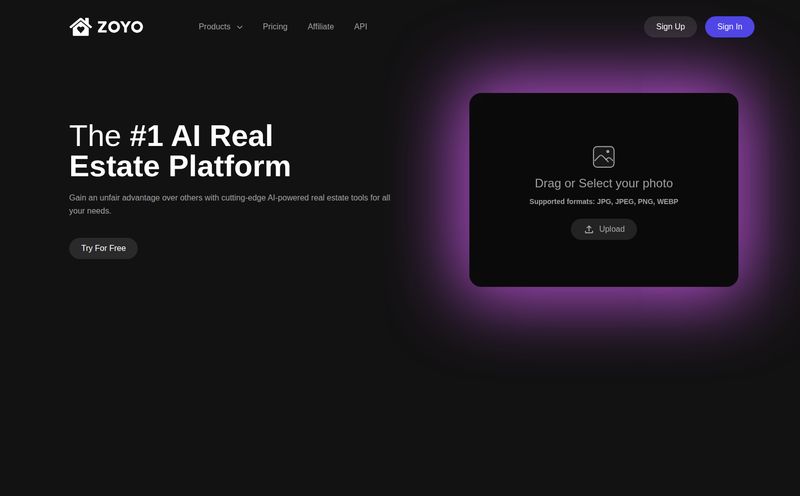We've all been there. You find what looks like the perfect house or apartment online. The pictures are stunning, the price is almost right, and you're already mentally arranging your furniture. But then the nagging question creeps in: what’s the neighborhood actually like?
So begins the frantic dance of a dozen open browser tabs. One for Google Maps Street View, one for the local police department's crime map (if you can even find it), another for school ratings, and maybe three more trying to figure out if the nearest grocery store sells something other than expired milk and regret. It’s exhausting. It’s inefficient. And honestly, it's a terrible way to make one of the biggest decisions of your life.
For years, I've preached about doing your due diligence. But the process has always felt so… fragmented. A few weeks ago, I stumbled upon a platform called LocaleScan, and I have to admit, it piqued my curiosity. It claims to be an all-in-one solution for this exact problem. But does it live up to the hype? I decided to take a look.

Visit LocaleScan
What is LocaleScan, Really?
Think of LocaleScan as a private investigator for your future neighborhood. Instead of you having to piece together clues from all over the web, it brings all the critical location data into one clean, interactive dashboard. It's designed to give you a detailed, data-driven overview of the area surrounding a property, moving beyond just the property lines. The whole idea is to empower you—whether you're a first-time home buyer or a seasoned real estate investor—to make a decision based on hard facts, not just pretty listing photos.
A First Look at the Interface
My first impression? Clean. Deceptively simple, even. There are no overwhelming menus or confusing jargon. The process is broken down into three straightforward steps: specify a location, define how wide you want the search area to be (the "scan radius"), and then you get the results. That's it.
This simplicity is its strength. In an industry often bogged down by clunky software and overly complicated tools, this is a breath of fresh air. It feels less like a heavy-duty analytics platform and more like a consumer-friendly app, which is a huge win for accessibility.
The Data That Matters: Digging into the Features
Okay, so it's easy to use. But what about the data? Is it just surface-level stuff you could find with a quick search? This is where I was pleasantly surprised.
More Than Just a Map
The core of LocaleScan is its interactive map. Yes, we've seen maps before, but this one is layered with purpose. It visualizes different types of places with clear icons—a shopping cart for a grocery store, a book for a library, a hospital icon for medical facilities. This immediate visual context is something I've always felt was missing from traditional property portals. You don't just see a pin for your potential home; you see the entire ecosystem it exists within.
Uncovering the Good Stuff: Benefit Analysis
This is the fun part. The Benefit Analysis section is all about the perks of a location. We're talking about the proximity of local amenities like restaurants, shopping centers, and parks. It also pulls in data on education and childcare, showing you nearby schools, colleges, and daycare centers. For a family with young kids, seeing three highly-rated daycares within a 5-minute drive is a massive, tangible benefit that a simple property listing would never tell you.
Facing the Facts: The Risk Assessment
Now for the serious business. LocaleScan’s Risk Assessment feature is arguably its most powerful component. It provides crime statistics, details on environmental hazards (think flood zones, proximity to industrial sites), and even data on the area's economic stability, such as unemployment rates. I know, looking at crime stats can be a downer, but going in with your eyes wide open is non-negotiable. This isn’t about fear-mongering; it’s about making an informed choice. It’s better to know about a potential risk before you sign on the dotted line, not after.
Who Should Be Using LocaleScan? (Hint: Probably You)
While the tool seems perfect for anxious home buyers and renters, its application is much broader. I can immediately see how valuable this would be for:
- Real Estate Investors: Imagine being able to quickly screen potential investment areas for red flags like high unemployment or environmental risks. Or, conversely, identifying up-and-coming neighborhoods by spotting trends in new business openings. This could be a huge time-saver.
- Real Estate Agents: An agent who can provide clients with a detailed, unbiased LocaleScan report is an agent who adds serious value. It builds trust and helps clients feel more confident in their decisions.
- Urban Planners and Developers: Understanding the existing fabric of a community is the first step in any development project. This tool offers a quick and comprehensive snapshot to inform that process.
The Elephant in the Room: Pricing and Data Sources
Alright, no tool is perfect, and there are a couple of question marks with LocaleScan that I have to point out. First, the pricing. As of my review, there's no clear pricing page. The site has a "Try It Now!" button, but what happens after that is a mystery. Is it a freemium model? A one-time fee per report? A monthly subscription? Your guess is as good as mine, and for a professional tool, that's a bit of an oversight. I hope they clarify this soon.
Second, and this is a big one for a data geek like me, the data sources are not cited. Where is the crime data coming from? How current are the unemployment stats? For the tool to be truly trustworthy, especially for major financial decisions, transparency about its data sources is critical. I'm not saying the data is wrong—it looks comprehensive—but without knowing its origin, you have to take it with a grain of salt. For now, I'd use it as a powerful starting point for my research, but I'd still want to cross-reference the most critical data points with official sources, like those from a government statistics bureau or local law enforcement.
My Honest Take: Is LocaleScan Worth Your Time?
So, what's the verdict? Despite the question marks, I'm genuinely impressed with LocaleScan. It successfully consolidates a frustrating and time-consuming research process into a single, user-friendly platform. It's a fantastic tool for getting a quick, yet surprisingly deep, understanding of a neighborhood's character.
It acts as a powerful first-pass filter. It can help you instantly rule out locations with obvious deal-breakers and highlight areas that deserve a closer look. Is it the be-all and end-all of property research? No. You should still visit the neighborhood, talk to locals, and verify critical data. But does it make that entire process smarter and more efficient? Absolutely.
Frequently Asked Questions
- What kind of data does LocaleScan provide?
- It offers a mix of benefit and risk data. This includes local amenities (stores, restaurants, parks), education and childcare facilities, crime rates, environmental hazards, and local economic indicators like unemployment rates.
- Is LocaleScan difficult to use?
- Not at all. Its main strength is its simplicity. The user interface is clean and intuitive, following a simple three-step process: locate, set a radius, and view the results.
- Can real estate agents benefit from LocaleScan?
- Definitely. Agents can use it to provide clients with detailed neighborhood reports, adding a layer of professionalism and data-backed insight that can help build trust and guide client decisions.
- How much does LocaleScan cost?
- That's currently unclear. The website does not have a public pricing page, so it's unknown if the service is free, subscription-based, or has a per-report fee.
- Where does LocaleScan get its data from?
- This is another area that lacks clarity. The platform doesn't disclose its specific data sources, so while the information is comprehensive, its accuracy and timeliness can't be independently verified without cross-referencing.
- Is LocaleScan better than Zillow or Redfin for neighborhood research?
- It serves a different, more focused purpose. While platforms like Zillow and Redfin are primarily for property listings, LocaleScan is a dedicated neighborhood analysis tool. It provides a more concentrated and layered view of the area around the property, which is often more detailed than the neighborhood stats on major listing sites.
Closing Thoughts
In the high-stakes world of real estate, information is power. Tools like LocaleScan represent a significant step forward in making critical neighborhood data accessible to everyone, not just data scientists or big development firms. While I'm waiting for more transparency on pricing and sources, I'm optimistic. It has the potential to become an indispensable tool in my SEO and property analysis toolkit, and it just might be for you, too. Give it a try—you might be surprised by what you uncover about that "perfect" location.
References and Sources
- LocaleScan Official Website: https://www.localescan.com/
- United States Census Bureau: https://www.census.gov/


